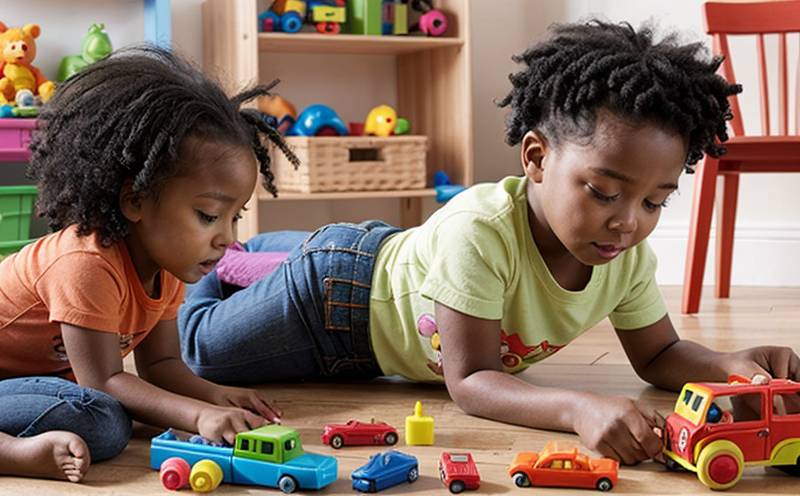Pool Toy Safety Testing
Pool toys are among the most cherished items in a child’s summer repertoire. However, ensuring their safety is paramount to prevent any accidents or injuries. Pool toy safety testing involves rigorous checks that ensure these products meet international standards and guidelines designed to protect children.
The process begins with the selection of the pool toy for testing. Typically, this includes inflatable toys such as rafts, floaties, rings, and water wings used in swimming pools or bathtubs. These toys are subjected to various tests that simulate real-life conditions under which they might be used.
One of the primary tests is the air retention test, ensuring the toy maintains its shape and integrity even when submerged. This helps verify that the material composition does not compromise safety. Another critical aspect is the burst strength test, where the toy’s maximum pressure capacity is determined to ensure it can withstand the water pressure without bursting.
Material testing is also essential in pool toy safety testing. The materials used should be non-toxic and free from hazardous substances that could harm children if ingested or come into contact with skin. This includes checking for lead content, phthalate levels, and other toxic chemicals.
The durability of the toys is tested by simulating wear and tear over time. This helps in assessing how well the toy can withstand the rigors of daily use without breaking apart into small parts that could pose a choking hazard or other risks to children.
Additionally, the toy’s design must adhere to specific safety guidelines. For instance, handles should be securely attached and not detach easily, and the surface finish should be smooth and free from sharp edges or points. The colorfastness of the toy is also tested to ensure that any dyes do not come off into the water.
- Material Safety: Ensuring toys are made from safe materials without harmful chemicals.
- Airtightness: Testing for leaks and ensuring the toy maintains its shape in water.
- Burst Strength: Determining the maximum pressure a toy can withstand before it bursts.
- Durability: Assessing how well the toy holds up under repeated use and abuse conditions.
The testing process is conducted in an ISO/IEC 17025 accredited laboratory, ensuring that the results are accurate, reliable, and compliant with international standards. This accreditation guarantees that the testing meets the highest scientific and technical standards. Compliance with standards such as ASTM F963-17 (United States), EN 71-1 to EN 71-4 (European Union), and IEC 62196 (International) is crucial for ensuring the safety of pool toys.
The testing process not only ensures that each toy is safe but also provides valuable insights into potential improvements. By identifying any shortcomings early in the product development cycle, manufacturers can make necessary adjustments to enhance safety and performance.
Eurolab Advantages
EuroLab offers unparalleled expertise in pool toy safety testing, providing services that align with international standards such as ASTM F963-17, EN 71-1 to EN 71-4, and IEC 62196. Our experienced team of engineers and technicians ensures that every test is conducted meticulously, ensuring the highest level of accuracy and reliability.
Our state-of-the-art facilities are equipped with the latest instrumentation and software, allowing us to perform a wide range of tests efficiently and effectively. With our ISO/IEC 17025 accreditation, we provide results that can be trusted by manufacturers, retailers, and regulatory bodies alike.
At EuroLab, we pride ourselves on providing personalized service tailored to the specific needs of our clients. Whether you are a small manufacturer looking for compliance testing or a large corporation seeking to enhance product safety, we have the expertise and resources to meet your requirements. Our team is dedicated to ensuring that every pool toy tested meets not only local but also international standards, thereby protecting children’s health and well-being.
Moreover, our advanced technology allows us to stay abreast of new developments in safety testing methodologies and guidelines. This ensures that we are always providing the most up-to-date and relevant information to our clients. Our commitment to excellence is reflected in every aspect of our service, from initial consultation to final certification.
Quality and Reliability Assurance
- Comprehensive Testing: Conducting a thorough evaluation of the toy’s materials, design, and functionality.
- Accreditation: Ensuring our laboratory is ISO/IEC 17025 accredited for reliability in testing results.
- Standard Compliance: Guaranteeing that all tests are conducted according to ASTM F963-17, EN 71-1 to EN 71-4, and IEC 62196 standards.
- Data Integrity: Maintaining the highest level of accuracy in our data collection and reporting processes.
The quality assurance process at EuroLab is rigorous and systematic. We ensure that every step of the testing procedure adheres to established protocols, thereby guaranteeing the reliability and validity of the results. This approach not only enhances product safety but also builds trust with consumers and regulatory bodies.
Customer Impact and Satisfaction
EuroLab’s pool toy safety testing service has a direct impact on customer satisfaction by ensuring that the products they use are safe for children. By providing accurate, reliable, and compliant test results, we help manufacturers meet regulatory requirements and enhance product quality.
Our comprehensive approach to testing not only ensures compliance but also helps identify potential issues early in the development process, allowing for timely corrections. This proactive stance contributes significantly to customer satisfaction by delivering products that are both safe and of high quality.
Moreover, our personalized service model allows us to understand our customers’ unique needs and challenges. Whether it’s addressing specific regulatory requirements or improving product safety features, we work closely with clients to ensure their success. Our goal is not just compliance but also continuous improvement in product design and performance.





